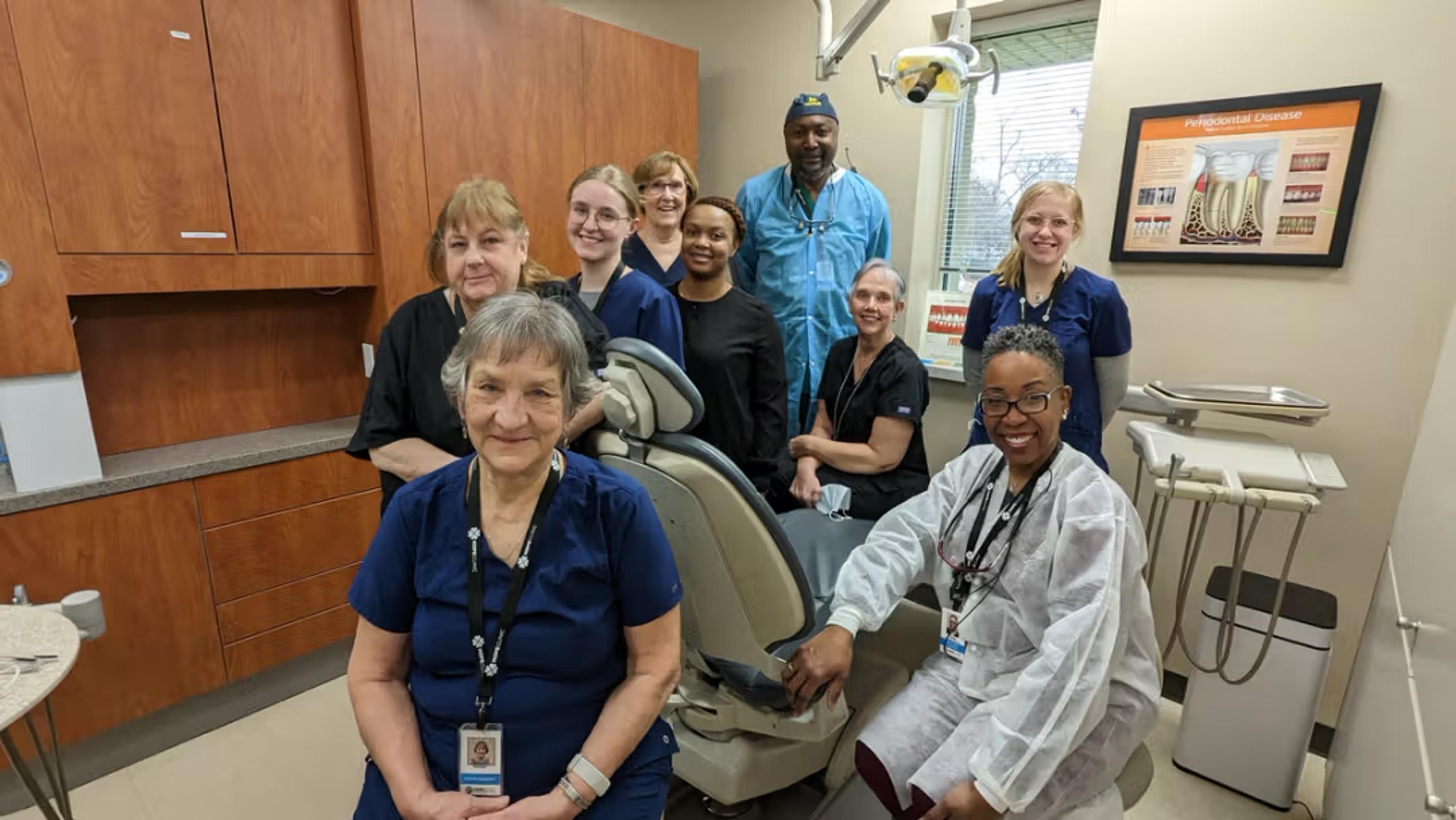
Blue Daily
Articles

Community-Driven Solutions to Health Care Affordability
- A big factor in driving the total cost of the health care system is the amount of money spent providing care to uninsured individuals.
- To change the trajectory of health care costs, the health care system must address what happens when people are uninsured or underinsured and lack access to basic care.
- Blue Cross' investments in free clinic grants help nearly 50 clinics provide care to more than 250,000 uninsured and underinsured Michigan residents each year.
- Blue Cross also invests in community organizations already serving residents at the local level. These partnerships improve health before costly medical care is needed.

Michigan Big Show: Why Helping Uninsured People Makes Health Care More Affordable for Everyone
- One of the ways Blue Cross supports affordability is by helping people who are uninsured or underinsured gain access to care outside of hospital emergency rooms.
- Getting people access to basic, preventive care keeps them healthier and keeps costs from rising across the entire health care system.
- When hospitals provide care to uninsured people, the costs often go unpaid – but they don’t go away. They are absorbed by hospitals and increase the pressure on hospital prices charged to those who can pay.
- Blue Cross' investment in safety net clinics and prevention support through initiatives like Building Healthy Communities demonstrate how we work to keep health care costs from rising for everyone.

Primary Care and Value-Based Care: How We’re Reducing Health Care Costs
- Strengthening primary care and shifting to value-based payment models can lower health care costs by emphasizing prevention, early intervention and better management of chronic conditions, which drive most spending in Michigan.
- Blue Cross Blue Shield of Michigan’s value-based care approach rewards providers for quality, outcomes and efficiency rather than volume, reducing unnecessary services and improving patient health.
- Longstanding partnerships with physicians and hospitals have helped avoid more than $6 billion in health care costs over nearly two decades, limiting premium increases while improving care coordination and outcomes.

How Blue Cross Blue Shield of Michigan is Lowering Drug Prices for Members
- Drug prices rose three times faster than inflation in 2024, and Blue Cross Blue Shield of Michigan is working on solutions to reduce costs for members.
- We are offering lower net cost therapies such as biosimilars to manage the prices of high-cost brand name drugs.
- In 2025, Blue Cross converted 99% of members who use autoimmune therapies such as Humira to biosimilars, saving $80 million.

Solutions to Rising Health Care Costs for Small Businesses
- Health insurance costs have skyrocketed to the point that many Michigan small businesses can't hire new people, or are forced to hire fewer people.
- Between 2022 and 2025, statewide average health insurance rate increases for employers jumped from about 1.2% to 8.6%, creating instability that has become difficult for small businesses to manage.
- As medical costs rise 40% faster than other commodities, systemic change is required, making engagement at the state and local levels critical for the future of health care costs.

What to Know About Michigan’s Recent “Super Flu” Surge
- As of Jan. 5, 818 people were hospitalized with the flu in Michigan.
- The current surge of flu cases is likely driven by a new strain of the flu called H3N2 Subclade K. Health experts are calling this strain the “super flu.”
- Vulnerable populations such as older adults and children under the age of 4 are being hit hard by the super flu.
- This surge is a reminder of the importance of the flu shot. Flu vaccines prevented an estimated 240,000 hospitalizations during the 2024–2025 flu season.

How Blue Cross Blue Shield of Michigan Is Leading the Shift to Affordable, Value-Based Care
- Under fee for service, providers are paid based on how many services they deliver, not whether patients get healthier. That approach drives unnecessary care and rising costs. Value-based care changes the equation.
- That approach drives unnecessary care and rising costs. Value-based care changes the equation.
- By encouraging early intervention and proactive management of chronic conditions, Blue Cross’ value-based programs help keep members healthier — and out of costly care settings like emergency rooms and hospitals.
- By shifting incentives toward prevention, quality and accountability, and by building strong partnerships with providers, Blue Cross is helping lead Michigan toward a more affordable, sustainable health care system.

What is an Overactive Nervous System?
- An overactive sympathetic nervous system means the body's "fight or flight" response stays constantly activated, even without tangible threats present.
- Certain behaviors and chronic conditions can affect our nervous system, causing damage and leading to an overactive nervous system.
- Overactive nerves and "nervous system overload" can also be caused by anxiety disorders and chronic stress.
- While some conditions that affect the sympathetic nervous system cannot be prevented, living a healthy lifestyle can delay the onset of some conditions.

Blue Cross Utilizes Preferred Pharmacy to Manage Specialty Prescription Drug Costs
- Starting Jan. 1, 2026, Blue Cross members with PPO self-funded commercial group coverage are to fill their specialty drug prescriptions through Walgreens Specialty Pharmacy for home delivery or at Walgreens retail pharmacy stores.
- The Exclusive Specialty Network will provide members with discounted specialty medications, 24/7 pharmacist and nurse access, and dedicated care coordinators to help lower annual specialty‑drug spending.
- The shift completes a multi‑year rollout that began in 2019, aligning all commercial pharmacy plans under the exclusive specialty program while the insurer continues to promote additional cost‑saving options such as biosimilars, the Civica Rx partnership and other discount initiatives.

The Pharmacy Solutions Helping Blue Cross Rewrite the Prescription for Affordability
- Blue Cross held pharmacy spending flat in 2025 by expanding a biosimilar program that cut monthly costs on drugs like Humira and Stelara from about $10,400 to less than $1,000, saving members more than 90% off list prices.
- A partnership with Evio Pharmacy Solutions created a direct‑purchasing model that bypassed traditional PBMs, lowering prescription and specialty drug prices to less than 10% of brand‑name costs.
- The insurer plans to launch an exclusive specialty pharmacy program in 2026 for large‑group fully insured plans, aiming to keep future high‑cost therapies affordable while protecting members and employers.

Blue Cross Blue Shield of Michigan Partners with WellSky® and tango to Deliver High Quality Post-Acute Care Management
- Together, tango and WellSky provide a data-driven approach to addressing long standing challenges in post-acute care (PAC).
- PAC services support recovery through rehabilitation, skilled nursing, wound care and other interventions that help our members recover confidently in their home.
- The WellSky-tango partnership aligns with BCBSM values by providing a prospective, episodic reimbursement model that also includes value-based incentives for home health care providers.

Blue Care Network’s Primary Care Physician Focus Network Expands Into 11 New Counties for the 2026 Plan Year
- BCN's PCP Focus network could be a good fit for those who need assistance in managing their general health, getting timely preventive care and receiving annual physicals.
- It is a plan worth exploring if you expect to be on a tight budget in the coming year.
- Individuals can choose from a list of primary care physicians that provide quality care and a high level of efficiency, both of which help lowers costs and keep health care affordable for everyone.
- We have expanded our list of eligible counties for 2026, and in doing so, have expanded our service area footprint by 55% for 2026.

Blue Cross Blue Shield of Michigan Partners with Corewell Health to Improve Several Areas of In-Hospital Patient Care
- In June, Blue Cross and Corewell announced a new agreement that will keep Corewell facilities in the Blue Cross network through 2030.
- Blue Cross and Corewell Health are putting a focus on improving several targeted areas of patient care.
- Those areas of include in-hospital fall and hip-fracture rate, post-operative sepsis rate and more.

Biosimilars Save Members More Than 90% Over Brand-name Specialty Drugs in 2025
- The Blue Cross Blue Shield of Michigan biosimilar program is saving members more than 90% off the list price of high‑cost drugs such as Humira and Stelara, cutting monthly costs from roughly $10,400 to less than $1,000.
- The shift to biosimilars could generate up to $50 million in savings for employer groups and members this year, with 99% of Humira and Stelara users now on the lower‑priced alternatives.
- Partnerships with Evio Pharmacy Solutions and a limited‑distribution specialty network enable home delivery and negotiated pricing that accelerate adoption of biosimilars.

Blue Cross Partner CivicaScript Offers Generic Drugs at Significant Savings
- BCBS partner CivicaScript develops, manufactures and distributes common high-price generic prescription drugs for a fraction of what many consumers otherwise pay.
- CivicaScript recently released a version of generic capecitabine, which is about $1,500 per month less than versions available from other distributors.
- CivicaScript's approach could significantly lower members’ out-of-pocket costs for deductibles and copayments, while also reducing costs for group customers and insurers.

What’s Changing in Michigan’s Health Insurance Market — and What It Means for You
- Blue Cross Blue Shield of Michigan remains committed to offering plans in all 83 counties, ensuring continued access to affordable, high-quality care.
- Enhanced Premium Tax Credits (EPTCs) — temporary federal subsidies that lowered health insurance costs for millions of Americans — are set to expire.
- With EPTCs set to end, insurers are adjusting rates to account for reduced federal funding, rising medical costs, and increased demand for care.
- Several insurers will no longer offer ACA/Marketplace plans in Michigan for the 2026 coverage year, leaving an estimated over 200,000 people needing new plans.

The Detroit News Reports on BCBSM Affordability Efforts
- Upstream health care prices continue to grow more expensive — and this trend is showing up downstream in Michigan’s health insurance premiums.
- The imbalance between claims paid and premiums collected is driving double-digit premium increases for 2026.
- A recent article from The Detroit News features comments from experts in the health care and health insurance field regarding the impact of the claims imbalance, hospital consolidation and rising prescription drug prices, and how each affect affordability.

Blue Cross Collaborative Care is Your One-Stop Shop for Whole Person Health
- Physical health and mental health are closely related. When physical and mental health issues compound, your whole person health suffers.
- With Blue Cross Blue Shield of Michigan’s Collaborative Care model, primary care and OB/GYN practices integrate mental health services into their practices.
- Integrating care streamlines information processes, which reduces administrative overhead and associated costs.
- With Collaborative Care, your PCP’s practice can connect you to the right services based on recommendations from their behavioral health consultant.

What You Can Do to Limit Your Spend on Health Care and Health Insurance
- Blue Cross Blue Shield of Michigan and Blue Care Network offer no-cost preventive care services, including annual physicals and screenings, to help detect health issues early and avoid more expensive problems later.
- The Blue365 discount program offers members savings on gym memberships, fitness gear and healthy living services, making it easier to prioritize health without breaking the bank.
- Living a healthy lifestyle, using a Health Savings Account and taking advantage of preventive care can help individuals manage healthcare costs and reduce the financial burden on the healthcare system.

Taking Control of Your Spine and Joint Health: A Proactive Approach
- More than half of adults ages 18 and older are impacted by musculoskeletal (MSK) conditions.
- A healthy MSK system allows you to move freely, maintain your independence, and enjoy life to the fullest.
- Common conditions that can impact your MSK system include herniated discs, arthritis, osteoporosis and tendinitis.
- BCBSM and BCN offer information and programs to help you and your loved ones enjoy a life of mobility, flexibility and comfort.

Detroit Free Press: Health Care Costs Are Rising — and Michigan Businesses & Employees Are Feeling the Strain
- High drug prices, greater utilization and higher provider rates are causing insurers to pay out more in claims than they collect in premiums.
- Rising premiums are slowing the hiring process for small businesses.
- Blue Cross is tackling affordability by working to bring down the price of prescription drugs, partnering with providers to reward value over volume and investing in healthier communities.

What is Blue Cross Doing to Prevent Health Care Fraud?
- Financial losses due to health care fraud account for 3% to 10% of health care costs.
- Health care fraud takes on many forms, including durable medical equipment, services not rendered, telemarketing fraud and more.
- More than 100 doctors have been charged with health care fraud in Michigan alone over the last decade.
- If you suspect fraud, you can call the Blue Cross toll-free Fraud Hotline at 844-STOP-FWA.














































































